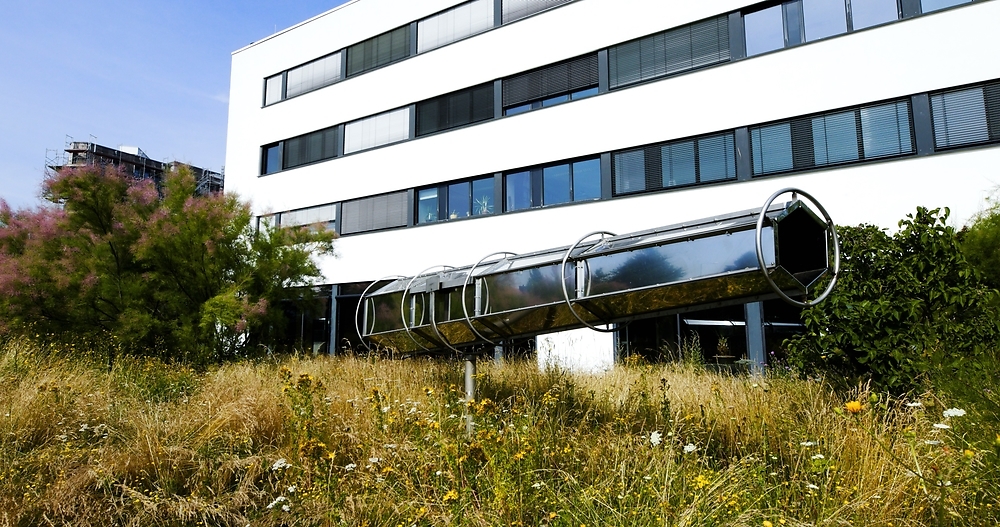November 16, 2021 | News | Interview
Sustainable Research at MPIDR

A wildflower meadow has bloomed behind the institute for the first time this summer. © Jan Waßmuth
One and a half years ago, Sophie Lohmann founded a group that promotes sustainable science at the Max Planck Institute for Demographic Research (MPIDR). The main focus is on reducing CO2 emissions. In an interview, the researcher tells us why this is important and how their goals will be achieved.
Dr. Lohmann, for the last two years there has been a group working on sustainability at the MPIDR, how did it come about?
Sophie Lohmann: That's right. Even before the pandemic, some of our colleagues and I were thinking about what it is like to travel for business. On the one hand, it is a great opportunity to exchange ideas with other researchers and gain experience. On the other hand, business trips also contribute a lot to our carbon footprint. That's why we started meeting as a group over lunch. We wanted to collect data about CO2 emissions related to business travel; we are, after all, a data-driven institute.
Do you have the data on that now?
Yes, first we estimated the amount of CO2 that all MPIDR employees emit through business travel per year and ended up with about 500 tons of carbon dioxide. We then compared our projection with data from our travel booking software and found that we had estimated pretty well.
How do you personally handle the question about business travel?
I ask myself which conferences I really must attend and whether a good hybrid concept would be sufficient. Or whether there are contacts I would like to make on site. Then I decide. You can only really get to America and Asia by plane. In that case, the only solution is to combine business trips as far as possible or to combine them with a longer research stay. I only travel to conferences in Europe by bus and train. Unfortunately, CO2 offsets within the Max Planck Society cannot be implemented with public funds yet but hopefully very soon. Therefore, I am looking privately and individually for a suitable CO2 offset option.
What are the goals of the sustainability group for MPIDR?
First, we want to calculate a CO2 baseline. That means we want to record how much CO2 our institute emits annually from its current operations. This includes not only business trips, but also heating and electricity. We have also asked our colleagues in the administration for figures on actual consumption.
Are there already examples that you use as a basis for calculating the footprint?
Yes, two institutes have already calculated their footprint: the MPI for Physics in Munich and the MPI for Astronomy in Heidelberg; the colleagues there have even published a paper in Nature Astronomy about it.
There are other sustainability groups within the Max Planck Society. The Max Planck Sustainability Network (MPSN) links individual initiatives. How did it come about?
The MPSN is a grassroots movement. Colleagues at Max Planck Institutes across Germany felt the need to do something. In May 2019, there was a meeting of MPI employees for the first time who wanted to exchange ideas on sustainability topics and the enthusiasm was so great that the network was founded on the spot.
The MPSN proposes further measures in a catalog of recommendations. These include insulating building facades, installing solar panels, preventing bird strikes on glass facades, and offering sustainable food. Which of these do you think is relevant for the MPIDR?
Certainly, business travel is the item with the greatest potential for CO2 savings. That's why I would like to see more support for online and hybrid events. Of course, I am aware that not everything can take place virtually. There is also an equity consideration. I don't want a solution that only allows experienced researchers to travel to conferences and excludes young scientists.
... and the other measures?
Food plays only a small role at our institute because we don't have a canteen. As far as biodiversity is concerned, the dead oak trees in our parking lot have been replaced by new plants this year. It's also great that a wildflower meadow has bloomed behind the institute for the first time this summer. Discussing solar panels and bird strikes is next on our list.
Do you have the impression that the pandemic has made a difference?
The digital infrastructure has grown. At the same time, there is also more awareness about how the health of the planet and the climate are connected.
What's next for the group at the MPIDR?
We're planning an internal survey at the Institute. We want to know more about our colleagues' business travels, for one thing, and also how they get to work each day. We then want to use this data to calculate our CO2 baseline. That will then be the basis for deciding on measures to reduce our carbon footprint at MPIDR. Personally, I think the fastest action is needed on CO2 emissions.
More Info
Sustainability group at the MPIR
Anyone who wants to join or has questions, please feel free to send an email to: sustainability@demogr.mpg.de
Meetings are held every fourth Monday of the month at 3pm, currently virtually.
Max Planck Sustainability Network (MPSN)
frontiersin.org/articles/10.3389
nachhaltigkeitsnetzwerk.mpg.de
Sign up
nachhaltigkeitsnetzwerk.mpg.de